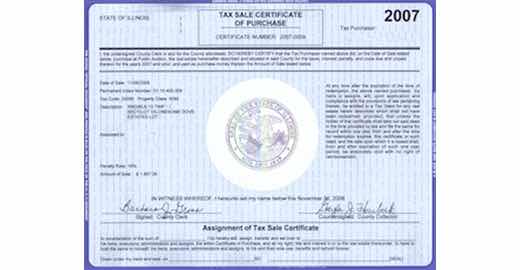There is no denying that real estate can be a very lucrative market and investment opportunity to consider, but owning a rental property can take up a lot of time, effort and energy. There is a lot to think about when it comes to rental properties. It isn’t just about getting the property ready to be occupied in some way, but it is also about thinking of the consistent maintenance that may go with it. However, the rental property market can be very lucrative. Investing in tax lien certificates is an alternative way to include real estate in your portfolio without having to cap a landlords income. Tax lien investing can be a little more complicated that owning mutual funds, shares and stocks, however, it can be a well suited option for many investors.
What are Tax Lien Certificates?
In truth, when a homeowner falls behind on things like their property taxes, country or municipality where the property is located, you can place a tax lien against the property. This is when a tax lien certificate is issued, usually by the tax assessors office, and they will verify that there is a lien in place. There is calculated to be billions of taxes going unpaid each year, which creates a broad market for investors.
Tax Lien Certificates as an Investment Vehicle
The one thing to remember is that if a property has a tax lien certificate against it, it can’t be sold or refinanced until the past due taxes have been paid. The tax lien certificate itself, however, can be purchased by an investor. Such as yourself. This would normally happen at public auctions that are organized by councils or municipal tax collectors offices. Auctions can be held online or in-person with certificates going out to the highest bidders.
If you become the winning bidder, then you would pay the tax office the amount of taxes owed on the certificate. You then assume the right to collect the money back from the homeowner, and can add some interest to see a return on the investment. The maximum interest rate that can be applied can vary, depending on where the property is situated. But it can be extremely lucrative in terms of profit potential.
It is worth noting, that the homeowner does have a certain amount of time to redeem the debt and pay what’s owed. This can depend on the redemption period that has been applied. If the owner doesn’t pay the taxes and the interest due, or even ignores such communication, you then have the right to foreclose on the property and enable you to sell to redeem the costs in that way.
Are there any benefits of Investing in Tax Lien Certificates?
In truth, there are a few different factors that make tax lien certificates an attractive and lucrative investment option. First of all, these investments often have a low threshold for buying into them. You may be able to purchase tax lien certificates at auction for only a small price, but the outlay and potential return could be in the thousands if not more. Depending on the amount of taxes owed.
If you are looking to only make a small investment at this time, it is possible to spread capital across multiple tax lien certificates. This can put you in the position of being able to diversify your property assets by where purchased tax lien certificates are located in different housing markets. Finding auctions to bid in isn’t that difficult either. You can simply contact the tax assessor for the specific county and find out when the next auctions are likely to take place.
Perhaps, more importantly, from an investment perspective, there is the opportunity to earn a consistent rate of return and this is what makes it a good investment to consider. With stocks and mutual funds, returns are determined by movements in the market. With tax lien certificates, returns are shaped by the interest rate that’s paid to you and the redemption period put in place. If you hold a tax lien certificate in a state with a higher maximum interest rate, your investment could yield a substantial payoff.
However, Tax Lien Certificates Aren’t Risk-Free
Like many different investment options, tax lien certificates also have some risks attached to them. One obvious one to mention is that you need to ensure you don’t buy a tax lien certificate for a property whose market value is less than the amount of taxes that are due. In that circumstance, the homeowner has no motivation to pay the debts of taxes owed.
There’s also the inherent risk that the homeowner won’t redeem the property, regardless of its value. A foreclosure could allow you to take ownership of the property but the legal fees can be expensive, and therefore make it less worthwhile. You may also face additional costs to repair or rehab the home once you take ownership. Foreclosing can also be problematic if there are other tax lien certificates attached to it or claims in place that need to be cleared before you can assume the title.
Tax liens typically have an expiration date that falls after the end of the redemption period. If your tax lien certificate expires, you wouldn’t be able to collect any unpaid taxes because your rights as a lien holder expire along with it. Which effectively means your investment is lost. You’d have to purchase any subsequent tax lien certificates to maintain your rights; otherwise, another investor could make a claim against the property. That increases your overall investment and also any potential return.
It is important to have due diligence
If you’re considering investing in tax lien certificates, you can’t afford to skimp on research and this is an important aspect before parting with any money. You need to understand what the state laws are regarding tax lien certificates, including the length of the redemption period, what your responsibilities are for notifying the homeowner that you’ve purchased the lien certificate and the maximum interest rate allowed for that specific area.
You should also research the specific market you’re interested in to understand how much tax lien certificates typically sell for at auction and how much competition you may face from other investors. This will help you to calculate whether your investment will be worth it long term. Finally, consider your larger investment strategy to determine what gap or need tax lien certificates could help to fill. Knowing what you’re investing in is only one element, you may need to understand a little more as to why there is a potential investment to make. It can help to understand the story behind to also calculate the risk.




